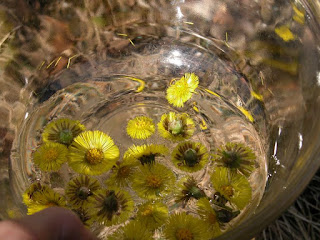Hi everyone! Lovely night tonight, well while I was playing Farm Ville I realized that it may be helpful to explain some of the terms that I might use on this blog. So when you get lost and your don't know what I am talking about! You can refure to this post.
Getting started I will go over some of the terms and what they mean and how they are used.
Are beverage made, like teas, By combining water with plants and steeping to extract their active ingredients.
The usual amounts of water used when making an infusion is about 1/2 to 1oz to a pint.
Boil your water then steep your herbs for about 10 minutes
Most often the water is poured over the herb but some require that it is added while boiling.
You should be using an enamel or porcelain or glass pot to brew your teas
Decoction:
This is used when you want to extract that mineral salts and the bitter parts of the plant, rather than the vitamins. Things like roots, wood, bark, and seeds
Boil about a half ounce per cup of water in a non metallic pot
Green parts can be added to cold water and brought to a boil, and boiled for 2 to 3 minutes, let it steep for 2 to 3 minutes covered in the pot.
Hard materials boil for 10 minutes
Strain the plants out and use like an infusion
Cold Extract:
Cold water will effectively preserve the most volatile ingredients and extract only small amounts of the mineral salts and bitter parts. Double the amount of plant material used for an infusion to cold water in a non metallic pot and let stand for 8 to 12 hours, strain and drink
Juice:
Add a little watter to the pressed material and press again to get the rest.
Useful for extracting water-soluble constituents.
Use the juice quickly due to the vitamins contents decline, or ferment.
Powder:
Powder can be taken with water, milk, or soup. You can sprinkle it on your food or swallow it in gelatin capsules.
The most common dose for powder is the amount you can pick up on the tip of a dinner knife.
Syrup:
Your basic syrup to which you can add medical ingredients can be made by boiling 3lbs raw or brown sugar in a pint of water until it reaches the right consistency.
You can boil the in Honey or store bought syrup as well.
Making syrup is wonderful for those hard to administer children!
Tincture:
Combine 1 to 4 ounces of powdered herb (depends on the herb potency) with 8 to 12 ounces of alcohol. add water to make it 50% (you will need to know what % alcohol you started with)
Let stand for 2 weeks, shaking once or twice a day; then strain and pour the liquid into a bottle suitable for storage.
They are usually used in drops
Essence:
Dissolve an ounce of herb's oil in one pint of alcohol, this is a good way to preserve the volatile essential oils of many plants, which are generally not water soluble.
Ointment:
Melt the mixture by heating it slowly, and stir until completely blended. add a little gum benzoin or a drop of a tincture of benzoin per ounce of fat ( when a perishable fat is used as a base) with help to preserve the ointment.
Poulice:
To prepare bruse, or crush the medical parts of the plant into a pulpy mass and heat.
If using dried plants moisten by mixing with hot, soft, adhesive substance, like moist flower or corn meal, or a mixture of bread and milk.
Apply directly to the skin.
I good way to spread the past is to spread it on a hot wet cloth, apply and wrap to retain the moisture and heat.
moisten with hot water as needed.
If you are using herbs that will irritate the skin put the paste between two pieces of cloth.
After removal rinse using an herb tea
This helps to soothe and pull impurities out of your body depending on what herb you use.
OK well that should be a healthy digest of information I will be adding more about baths and other uses.
I hope this helps you in making some of those treatments!
~Blessed be~












